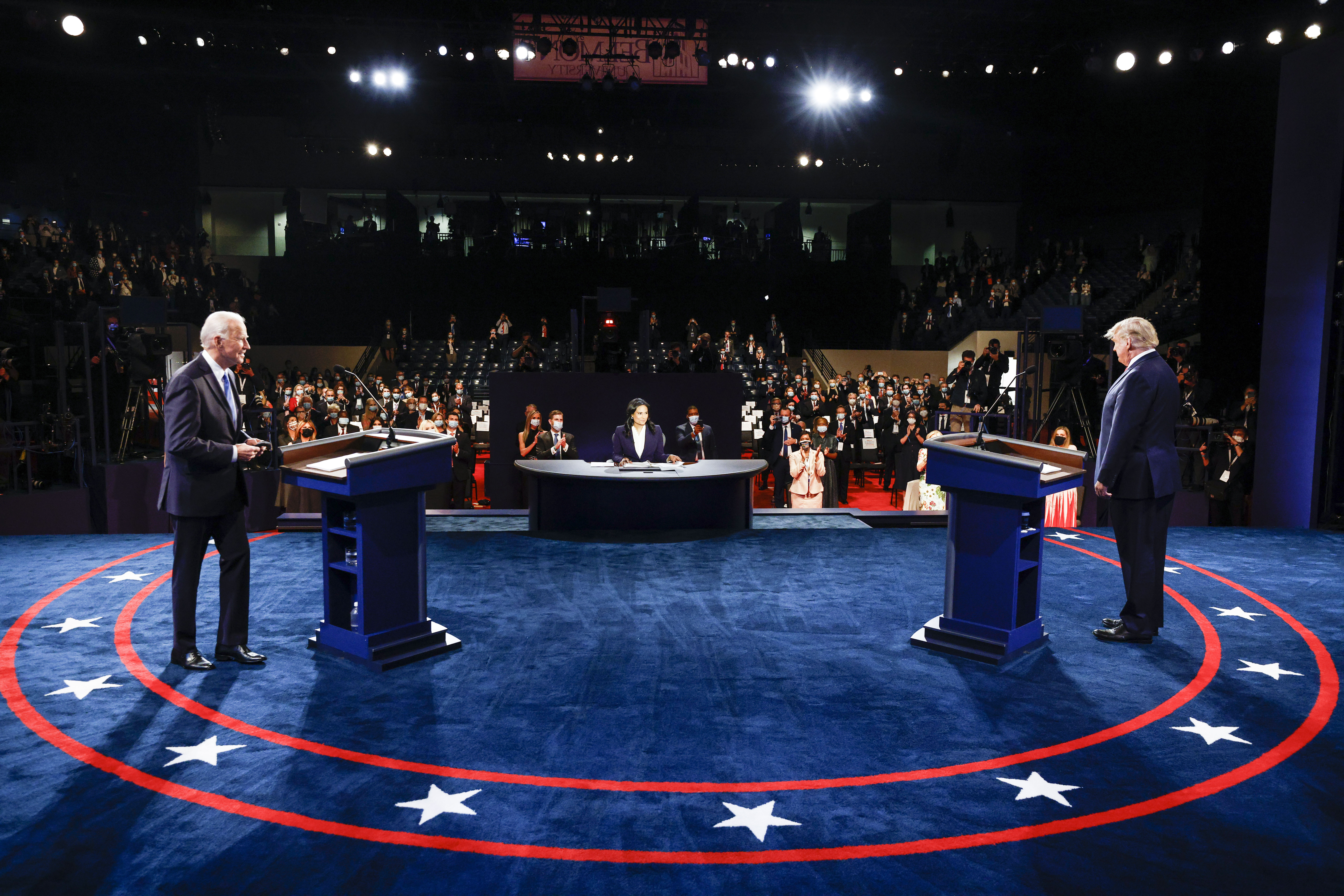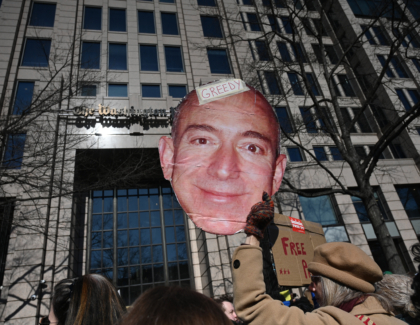Sign up for the daily CJR newsletter.
Joe Biden and Donald Trump may have just taunted each other into a pair of presidential debates—but in doing so, they further undercut the power of news organizations to make sure the debates are run in a way that best serves the voters, rather than the candidates.
Biden kicked off a flurry of activity Wednesday morning with a video message to Trump challenging him to debate, while tweaking him for being stuck in court for his criminal trial much of the week.
“Make my day, pal,” Biden said, doing his best Clint Eastwood impression. “Let’s pick the dates, Donald. I hear you’re free on Wednesdays.”
Trump quickly responded with a similarly dated pop-culture reference, posting: “Just tell me when, I’ll be there. ‘Let’s get ready to Rumble!!!’”
This led to a frenzy from the TV networks, which scrambled to put together bids to bring the two candidates in.
Biden and Trump quickly accepted a June 27 CNN debate proposal. They also agreed to a September 10 debate on ABC.
Biden’s team has agreed to a vice presidential debate with CBS. Trump and his team haven’t committed to that one yet, but are pushing for more for the top of the ticket. Trump announced he had accepted an October debate offer from the conservative Fox News and challenged Biden to join him. His campaign asked for additional dates as well.
“We propose a debate in June, a debate in July, a debate in August, and a debate in September, in addition to the Vice Presidential debate,” Chris LaCivita and Susie Wiles, the Trump campaign’s co–campaign managers, said in a memo. “Additional dates will allow voters to have maximum exposure to the records and future visions of each candidate.”
At least Trump and Biden now look like they’ll debate, which had appeared less than likely the past few months. But it’s still not a sure thing.
Trump has a long history of messing with the debates. He completely spurned debating his rivals during the 2024 primary, forced the cancellation of one of his scheduled debates with Biden in 2020 when he refused to appear remotely while he had COVID, and declined to appear at the final 2016 GOP primary debate before voters headed to the polls.
Biden isn’t a lock, either. His team says that he’ll only debate if it’s just against Trump—suggesting he’d back out if Robert F. Kennedy Jr. were included.
“President Biden made his terms clear for two one-on-one debates, and Donald Trump accepted those terms. No more games. No more chaos, no more debate about debates,” Biden campaign manager Jen O’Malley Dillon said in a Wednesday statement. “We’ll see Donald Trump on June 27th in Atlanta—if he shows up.”
CNN’s proposed debate parameters say that a candidate will be included if they receive at least 15 percent in four separate high-quality national polls and are qualified to appear on enough state ballots to theoretically win 270 Electoral College votes.
Say what you will about RFK Jr., but he’s winning about 10 percent of the vote in national polling averages and his campaign says they’re gathering enough signatures to get him on the ballot in most states.
Kennedy accused Biden and Trump of “colluding” to keep him off the debate stage—and he’s right.
If Kennedy does qualify, what happens then? Does Biden pull out? Might another network agree to his demands in order to steal CNN’s reflected prestige and ratings? If that happens, will Trump agree?
If all this sounds messy, it’s just one of the major consequences of arranging the debates in an ad hoc manner, while circumventing the Commission on Presidential Debates.
The CPD has governed debates for the past nine presidential cycles. That doesn’t exactly make it some hallowed, centuries-old pillar of democracy, but it has established two important dynamics: It forced the news networks to work together rather than compete with each other for debates, making it easier for them to resist presidential candidates’ demands about specific debate rules, like how long they’d run and whether moderators could cut off candidates’ microphones if they talked past their allotted time. It also guaranteed a lot more eyeballs, since the debates were carried by every network rather than being given exclusively to one.
CNN’s debate will be held far earlier than in previous years (and before either candidate will officially be his party’s nominee). That also makes it long before most voters are tuning in to the election enough to engage with a debate—and long enough that whatever happens won’t be fresh in voters’ minds come the fall election.
CNN claims that it’s available in eighty million US households, but even if we take the network at its word on that figure, that means fifty-seven million American homes won’t be able to watch the debate on TV. (The network says it plans to stream it online.)
As the Commission on Presidential Debates put it to the Associated Press on Thursday, it was created “specifically to ensure that such debates reliably take place and reach the widest television, radio and streaming audience.”
Without the commission controlling things, and the various news organizations respecting and backing its process, candidates can dictate which networks they debate on, when those debates happen, and how they are run. That’s great for the two major-party nominees and the networks that get exclusives on the debates—but not good for just about everyone else.
Other notable stories:
- Earlier this week, CJR’s Jon Allsop reported that The New Yorker had restricted UK readers’ online access to a story about Lucy Letby, a British neonatal nurse convicted of murdering seven babies, to comply with a court order limiting coverage of the ongoing case, but that the print edition would still be available in the country. The Times of London now reports that British legal authorities have discussed the article. Press Gazette’s Bron Maher spoke with lawyers about possible ramifications for The New Yorker; one pointed out that British law makes no distinction between digital and print publication, though another said that courts cannot enforce contempt orders against companies that are not incorporated in England. (The New Yorker no longer has a corporate entity in the UK, per Maher, though Condé Nast, its parent company, does.)
- On Wednesday, Edith Chapin, NPR’s editor in chief, outlined plans to “enhance and strengthen editorial operations” at the broadcaster, including by adding a new level of editorial review, known as “the Backstop,” to be managed by a new group of senior editors. According to Benjamin Mullin, of the New York Times, the announcement angered many NPR staffers, with some seeing it as “an unnecessary bottleneck” and others suggesting that it looked like a defensive response to recent criticism from Uri Berliner, a former editor who publicly accused NPR of inflexible left-wing thinking. (Chapin denied this.) Per Mullin, Michel Martin, a top NPR host, asked Chapin to identify who is funding the new initiative during an internal meeting; Chapin wouldn’t say.
- In media-jobs news, the Marshall Project, a nonprofit newsroom that covers criminal justice, announced that Susan Chira, its editor in chief, will step down early next year. Elsewhere, Justin Wells—who produced Tucker Carlson’s show on Fox News, then took over as president of Carlson’s independent media company after Fox ousted the pair last year—is leaving that role to launch his own company, though he will reportedly continue to advise Carlson. And—after the New York radio station WABC canceled a show hosted by Rudy Giuliani over his penchant for election lies—Mediaite reports that the right-wing network Newsmax could also ax Giuliani, though Newsmax strongly denied this to CNN.
- For Drilled and The Nation, Molly Taft went through a cache of internal oil and gas industry documents that were subpoenaed by Congress, and reported on what they reveal about the industry’s attempts to manipulate the press. The documents “provide lessons for journalists dealing with oil companies—to know that they’re keeping notes on you, your outlet, your potential opinions on climate action, and whether or not you can come around to their narrative,” Taft writes. “Journalists now know that Big Oil has a playbook, and it’s our responsibility to study it and factor that into our coverage.”
- And Nieman Lab’s Hanaa’ Tameez spoke with The Intercept about how “increasingly stress-inducing subject lines” in a recent email fundraising campaign (sample: “We’re not exaggerating. If people don’t pay for it, journalism will die”) helped the site to add more new recurring donors than it had targeted. “A shorter, two-week campaign with direct language is less likely to spam subscribers and turn off potential donors, in the organization’s view,” Tameez writes. “Donating also comes with a perk: no more emails.”
Has America ever needed a media defender more than now? Help us by joining CJR today.







